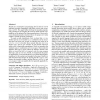136 search results - page 20 / 28 » Best practices in extreme programming course design |
117
click to vote
UPP
2004
Springer
15 years 7 months ago
2004
Springer
Abstract. Traditionally, autonomic computing is envisioned as replacing the human factor in the deployment, administration and maintenance of computer systems that are ever more co...
137
click to vote
AAAI
2006
15 years 3 months ago
2006
DTGolog, a decision-theoretic agent programming language based on the situation calculus, was proposed to ease some of the computational difficulties associated with Markov Decisi...
85
Voted
LREC
2010
15 years 3 months ago
2010
Evaluating complex Natural Language Processing (NLP) systems can prove extremely difficult. In many cases, the best one can do is to evaluate these systems indirectly, by looking ...
118
Voted
ICFP
2005
ACM
16 years 1 months ago
2005
ACM
Monads are commonplace programming devices that are used to uniformly structure computations with effects such as state, exceptions, and I/O. This paper further develops the monad...
131
click to vote
BMCBI
2011
14 years 8 months ago
2011
Background: With continuing identification of novel structured noncoding RNAs, there is an increasing need to create schematic diagrams showing the consensus features of these mol...

